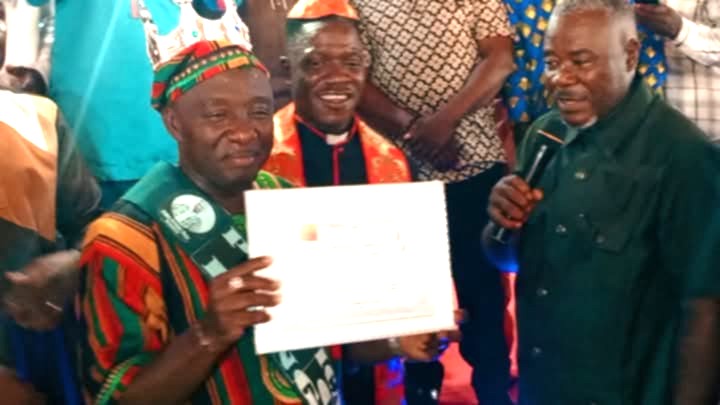The political landscape of Bong County, Liberia, has been recently shaken by a controversy surrounding the conferment of the title “godfather” upon Senator Prince Kermue Moye by a group of pastors identifying themselves as the Prophetic Call Like-Minded Pastors. This seemingly innocuous act has ignited a fiery exchange between Senator Moye and the leadership of the Bong County Christian Association (BOCA), exposing underlying tensions and raising questions about the intersection of religion and politics in the region. The crux of the dispute lies in BOCA’s public disavowal of the title and their distancing from the group that bestowed it. This disavowal has been met with sharp criticism from Senator Moye, who has accused BOCA’s leadership of being “paid agents” and of acting with political motivations.
Senator Moye’s core argument centers on the autonomy of individual churches and their right to honor individuals as they see fit. He contends that BOCA’s role is limited to fostering coordination, peace, and unity among churches, and does not extend to dictating which figures individual churches can recognize. He views BOCA’s public statement as an overreach of their authority and an infringement on the rights of individual congregations. He maintains that churches are free to bestow honorary titles during events such as Father of the Year celebrations without interference from overarching organizations like BOCA. This stance highlights a fundamental disagreement about the authority and scope of influence that umbrella religious organizations should wield over their constituent members.
Adding fuel to the fire, Senator Moye alleges that the opposition to his new title is rooted in political machinations. He suggests that BOCA is being used as a pawn in a larger political game, and calls for the organization to remain neutral and free from political influence. This accusation raises concerns about the potential for religious bodies to be manipulated for political gain, and underscores the delicate balance that must be maintained between religious freedom and political activity. It also casts a shadow over the motivations behind BOCA’s actions, prompting speculation about whether their public statement was genuinely driven by theological concerns or by external political pressures.
BOCA, however, presents a different perspective on the issue. In a statement issued by its president, Rev. Obediah Canmue, the organization clarified that it played no part in the conferment of the “godfather” title. The statement emphasizes that the title was bestowed by an independent group of pastors, and that BOCA was not involved in the decision-making process. This attempt to distance themselves from the act suggests a desire to avoid being drawn into the ensuing controversy. Furthermore, the statement highlights the theological implications of the title, noting that the term “godfather” lacks biblical basis.
Rev. Canmue’s statement also underscores BOCA’s commitment to the principle of collective leadership within the Christian community. This principle, which emphasizes shared responsibility and decision-making, stands in stark contrast to the individualistic approach championed by Senator Moye. By invoking this principle, BOCA implicitly criticizes the unilateral decision of the Prophetic Call Like-Minded Pastors to bestow the title without broader consultation within the Christian community. This difference in approach to leadership and decision-making further exacerbates the tension between Senator Moye and BOCA.
The dispute between Senator Moye and BOCA has ignited a broader debate within Bong County, revealing deeper fissures within the local community. The incident has become a focal point for discussions about the appropriate relationship between church and state, the role of religious leaders in political discourse, and the potential for religious institutions to be exploited for political purposes. The controversy has also highlighted the diversity of opinions within the Christian community itself, with some supporting Senator Moye’s right to be honored and others echoing BOCA’s concerns about the propriety of the title and the process by which it was conferred.
The unfolding drama in Bong County serves as a microcosm of the complex interplay between religion and politics that exists in many societies. It underscores the challenges of navigating the boundaries between religious freedom and political activity, and highlights the potential for conflict when these two spheres collide. The incident also raises important questions about the authority of religious institutions, the influence of political agendas on religious organizations, and the importance of maintaining open dialogue and mutual respect in addressing such sensitive issues. The long-term ramifications of this dispute remain to be seen, but it is clear that the incident has exposed underlying tensions and will likely continue to shape the political and religious landscape of Bong County for some time to come. The controversy serves as a cautionary tale about the potential for seemingly symbolic acts to ignite significant conflict and underscores the need for careful consideration of the implications of religious pronouncements within a politically charged environment.














